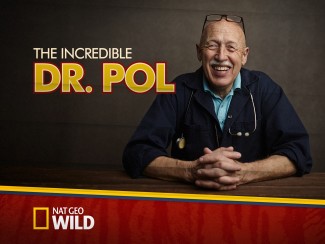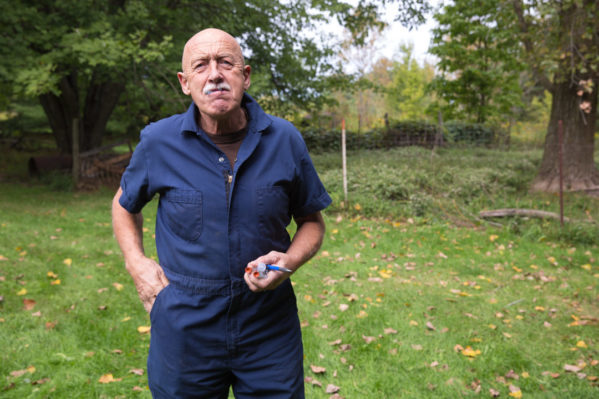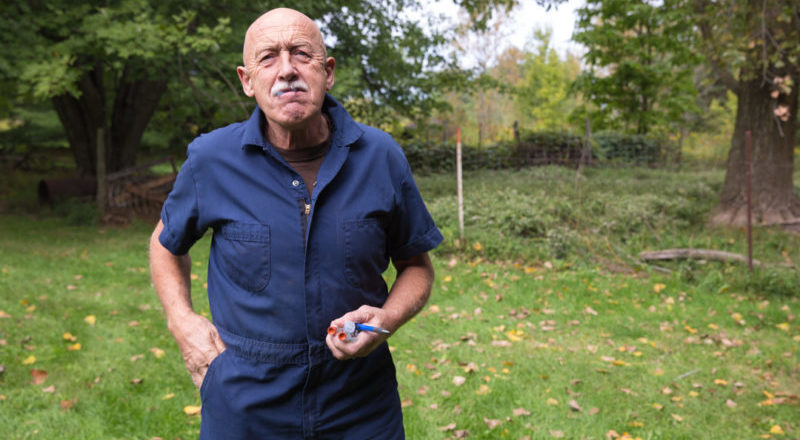INTERVIEW: Dr. Pol knows a thing or two about farm animals

Dr. Jan Pol, star of Nat Geo Wild’s The Incredible Dr. Pol, definitely knows his dogs and cats, but one of the veterinarian’s favorite jobs is tending to farms animals in rural Michigan. On the new season of the hit reality series, which premieres new episodes Saturdays at 9 p.m., Pol heads to the barns and fields of Michigan’s verdant pastures to help farmers save their animals.
“I was the youngest of six raised on a dairy farm in the Netherlands, so, yes, I would have liked to become a farmer,” Pol said recently in a phone interview. “But there’s not enough land in the Netherlands. And when my brother needed help, actually the veterinarian picked me up to deliver piglets at my brother’s place. That was a lot of fun. Then I said, ‘Well, if not a dairy farmer, I’ll be working with large animals.’”
Pol said that his veterinary care helps farmers by keeping cows and other animals healthy, especially during the important pregnancy time. A happy cow leads to a happy farmer. “Especially right now with the milk price being so low, the farmers have a very hard time making ends meet,” he said.
To document Pol’s work ethic, which sometimes extends to 14-hour days, Nat Geo Wild films roughly 100 hours of video every week. This is dwindled down to the 40-minute show, and because there’s so much editing, Pol doesn’t know what to expect on each new episode.

He does know that occasionally the camera operators get in the way of the animals he’s trying to help. “They don’t get in my way many times, but they get in the way, in front of the animals,” he said. “And [when] there’s two or three people standing in front of a shoot where an animal has to go through, it ain’t going. So I tell them, ‘Guys, move. The cow has got to go that way.’”
Watching The Incredible Dr. Pol is an education in not only veterinary care but also the art of multitasking. The doctor, who has been practicing for decades, can be seen running around his clinic, jumping in a car, helping out some farm animals, heading back to the clinic and taking patient after patient after patient.
“Once you’ve done this for so long you know what an animal looks like, and I think that’s one of the main things,” he said. “You have to know what a healthy animal looks like, and it makes no difference what animal it is.”
The key to being a veterinarian, Pol said, is common sense and looking for the abnormal in an animal. He also expects this common-sense factor of his staff and fellow veterinarians. “I want common sense,” he said. “We have five senses. Use them. Do not just go outside or in the clinic here, and when you have a sick animal, don’t run a whole bunch of tests trying to see if anything comes up. Make a presumptive diagnosis. Use your senses to make a presumptive diagnosis, and then run some tests to confirm the diagnosis. And many times when you can do that, you can keep the price down for these pet owners. And I think that’s very important.”
He added: “I always wanted kids to grow up with pets, and when [veterinary care] gets to be so high that pet ownership almost becomes unaffordable, the kids suffer.”
Another good way to keep the veterinarian costs to a minimum is prevention. Pet owners can take good, forward-thinking care of their pets, and this may mean fewer visits to Pol. “It’s like with everybody,” he said. “It’s with humans. It’s with animals, large animals, small animals. The preventive medicine is very important.”
Pol is a fan of neutering and vaccinating pets. He said a neutered pet makes for a better, healthier animal. “You should probably wait until they are basically halfway adult before you neuter them,” Pol said in reference to recent research. “But at the same time, do it before they come into heat the first time. You do it before the male dog lifts his leg, and his hormones are coursing through the body and he makes a nuisance of himself in the house. Take his hormones away, and he makes a lot better pet.”
The American Society for the Prevention of Cruelty to Animals also recommends spaying and neutering pets. The organization claims female pets will live longer, healthier lives, and neutering male pets will prevent testicular cancer and some prostrate problems. The ASPCA also has recommendations on when to spay and neuter one’s pets. Click here for more information.
Pol has been at this profession (and now this reality series) for so long that retirement is a logical consideration. The doctor does think about hanging up the stethoscope one last time, but that’s all he does, think about it. It doesn’t appear that retirement will become a reality. Pol still enjoys his work, and he can still keep up with the job.
“And thank goodness we don’t have mandatory retirement here, so, yes, as long as I can do it and the farmers and the clients depend on me, I’d like to keep going,” he said. “How long that is, I don’t know.”
By John Soltes / Publisher / John@HollywoodSoapbox.com
The Incredible Dr. Pol premieres new episodes Saturdays at 9 p.m. on Nat Geo Wild. Click here for more information on the show. Click here for previous Hollywood Soapbox interviews with Pol.

